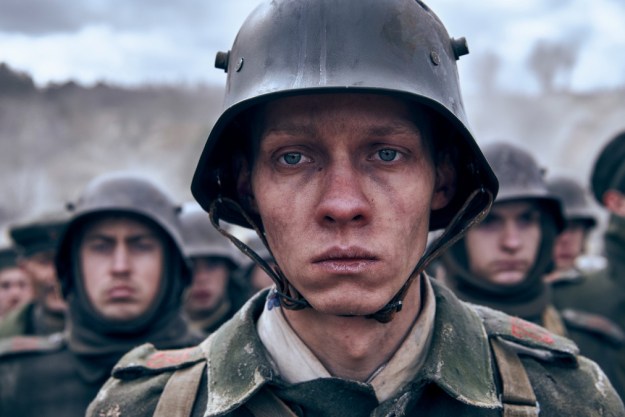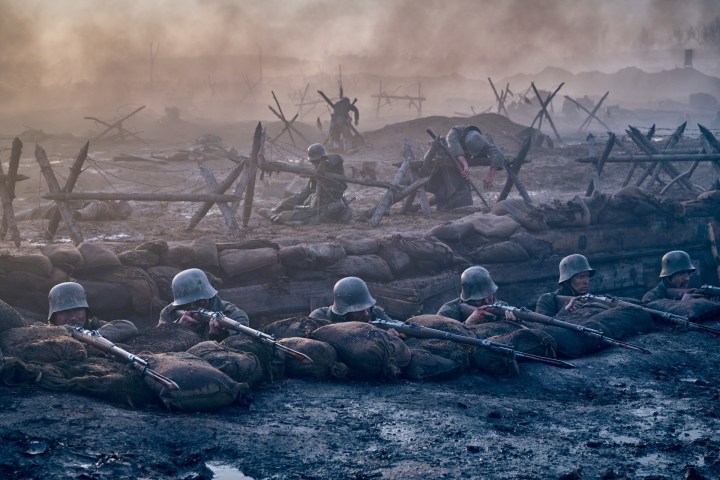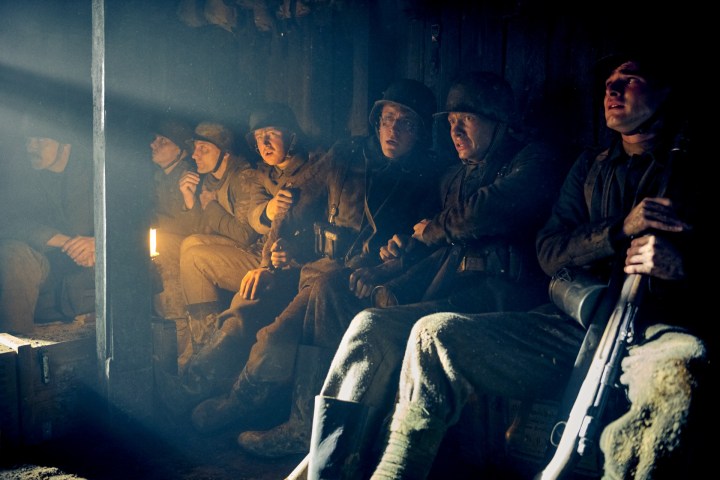
“All Quiet on the Western Front is the rare remake that equals the original with its stunning visuals and resonant anti-war message.”
- Stunning cinematography
- Great war scenes
- Memorable performances from the cast
- Makes war too beautiful
- Violence may be too much for some
The novel All Quiet on the Western Front was written from what seemed at the time to be a historical perspective. It came 10 years after World War I, where it’s primarily set, and was written by Erich Maria Remarque, a German veteran of the conflict. Coming out in 1928, though, the novel’s story of a German soldier who dies in the last days of the fighting was missing one important addendum: the war that was still to come.
The original movie adaptation had the same problem, even though it won Best Picture in 1930, at one of the first Academy Awards. The new German version of the film, though, which just recently hit Netflix, is able to more fully contextualize the First World War from a broader historical viewpoint. In doing so, it also somewhat complicates the message of the original novel without fully undermining it.
Note: this review contains plot spoilers for All Quiet on the Western Front.
The misery of war

At its core, every version of All Quiet in the Western Front is about the moment when idealism meets reality. It follows Paul Bäumer, a young German soldier who believes in the cause he’s fighting for and wants to prove that he can contribute to the efforts of his nation. The second he hits the Western Front, though, he discovers that this war is brutal, violent, dirty, and pointless. He loses friends, any shred of hope he once had, and eventually his own life.
The new adaptation keeps most of these core ideas in place but condenses Paul’s story somewhat so that most of it takes place in the final days of the war. In doing so, it introduces a secondary plot, one focused on the negotiations, or lack thereof, as Germany prepared to surrender. The way this film tells it, that surrender was a humiliation even at the moment. Any student of history knows too that the humiliation only got worse as Germany descended into poverty and chaos in the aftermath of the war’s end.
Showing us these negotiations, though, also underlines how pointless Paul’s struggle to survive ultimately is. He’s coming to the end of a conflict, but that conflict is really just a temporary reprieve. There will be more war, and more violence, so much so that it will eclipse the memory of those who died in the first pointless war.
Even peace doesn’t bring an end to fighting

To further reinforce what feels like a pointless peace, we’re also introduced to General Friedrich, a hard-right military mind who is infuriated by the end of the war, and what he feels to be a loss of German pride. The armistice that ends World War I is supposed to start on November 11 at 11 a.m., and Friedrich decides to launch a last-minute assault with the sole goal of assuaging his own ego.
He wants the Germans to go out proud instead of tucking their tales between their legs. Of course, all that happen is more people, including Paul, die miserable deaths; deaths they didn’t have to die.
When the peace does start, after just 15 minutes of fighting, it does bring an end to the conflict. But at this point, we firmly understand that the fighting will never really end. It will just stop for a while before it picks back up again.
That’s an intentional choice by director Edward Berger and by Leslie Patterson and Ian Stokell, who wrote the screenplay with Berger. Although it doesn’t come from the novel, it reinforces the notion that wars are only ever really fought because of a man who becomes too proud. It’s why this kind of violence happens, and it’s why, at least according to this version of All Quiet on the Western Front, it will never really end.
All the beauty and horror of war

Like any good war movie, All Quiet on the Western Front is attempting to be anti-war. Much has been written about whether it’s even possible to make an anti-war movie, and this movie has all the usual problems that war movies run into. It’s breathtakingly beautiful, even when the soldiers are covered in some combination of blood and mud. The cinematography captures stunning sunrises, barren trees, and a real sense of the distance between two enemy trenches.
The battle sequences, too, are both horrific and awesome. You’re thoroughly compelled by them, even when you know that you should be utterly horrified by what happens. All Quiet on the Western Front is too cool to be purely anti-war, but that’s not really what it’s trying to do.
Instead, this movie suggests that war sucks, yes, but it’s also inevitable. In that way, it’s even more despondent than the typical war movie, suggesting that nothing can be done to prevent conflict, and when it happens it is not nearly as heroic and inspiring as all the propaganda might suggest. War is brutal, war is hell, and war will destroy everything it touches.
Of course, that’s not to suggest that there are no reasons to wage war. World War II was, for those fighting with the Allied Powers, as close as a side ever comes to fighting a war for the “right” reasons. Still, it’s a war, and lots and lots of people are going to die who could have lived instead. The worst part, of course, is that the fighting doesn’t end when the war stops, and the idea of peacetime itself is something of an illusion.
A war story worth looking at

There’s not much hope to be found in All Quiet on the Western Front, except for those final moments of Paul’s life. He’s been forced into one last-ditch battle, and although he can feel the pointlessness of the fight, he fights anyway like the dutiful soldier that he is. This final fight is the one he loses, but after he’s been stabbed through the back by a French soldier, he has a moment to just breathe and look around him. What he sees is gray skies and ash, but in its way, it’s a beautiful sight. It’s a moment of peace, not separated from war, but inextricably linked to it. As depressing as that might seem, maybe it’s all there is.
All Quiet on the Western Front is currently streaming on Netflix.
Editors' Recommendations
- 10 best epic movies of all time, ranked
- 3 Netflix movies like Oppenheimer you should watch right now
- The School for Good and Evil review: Middling magic
- Andor review: Rogue One prequel is slow-burn Star Wars
- Glass Onion review: a deviously intricate Knives Out sequel




